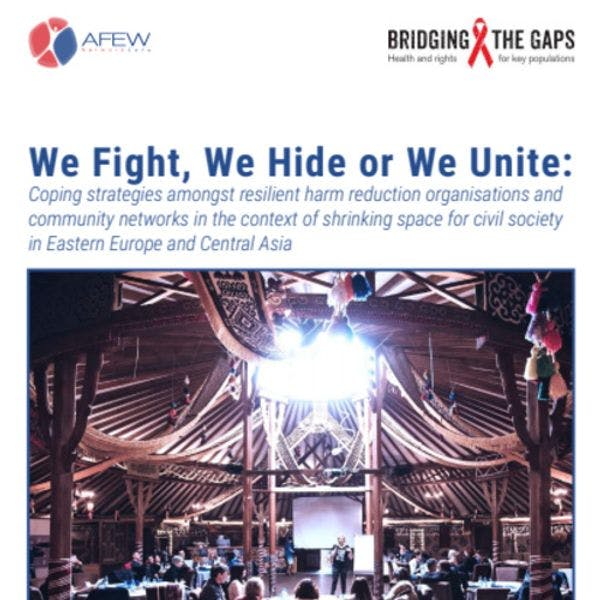Luchamos, nos escondemos o nos unimos: Estrategias de supervivencia entre organizaciones de reducción de daños y redes comunitarias resilientes en el contexto de la reducción del espacio para la sociedad civil en Europa del Este y Asia Central
La organización AFEW examina los nuevos retos y soluciones de las que disponen las organizaciones de reducción de daños frente a las nuevas leyes que restringen la libertad de acción de la la sociedad civil en Europa del Este. Más información, en inglés, está disponible abajo.
The title of this report, ‘We Fight, We Hide and We Unite’, reflects the survival strategies we identified amongst resilient harm reduction non-governmental organisations (NGOs) and community networks of people who use drugs (PWUD) in Eastern Europe and Central Asia (EECA). This report details our findings from the situation assessment, ‘The Shrinking Space for Civil Society in Eastern Europe and Central Asia: Coping strategies amongst resilient harm reduction organisations and community networks in the context of a shrinking space for civil society in Eastern Europe and Central Asia’, conducted in the summer of 2017. This assessment forms a part of the regional approach of the AFEW Network within the ‘Bridging the Gaps: health and rights of key populations’ programme (hereafter, the ‘Bridging the Gaps’ programme), financed by the Ministry of Foreign Affairs of The Netherlands. Furthermore, within this programme, the AFEW Network implements four country programmes, namely, in Georgia, the Kyrgyz Republic, Tajikistan and Ukraine.
In EECA, we have observed a diminishing space for civil society organisations (CSOs), perhaps best exemplified by the ‘Foreign Agent Law’ in the Russian Federation. The shrinking civil society space threatens the effectiveness of the response to HIV and other public health issues, particularly as it pertains to the health and rights of key populations. This pillar of the regional approach seeks to build upon progress made and support strategies that work, thereby reclaiming that space for civil society involvement (CSI). In this way, we work towards an effective HIV and public health response that respects the human rights of key populations and the survival of a healthy civil society.
